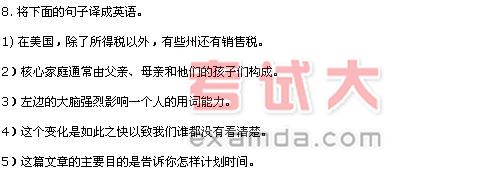Thus noise pollution is a serious environmental concern. The indifferent attitude toward noise should be overcome; considerable efforts should be made to alert people to the grave effects which may stem from an excessively noisy environment.
4) We can learn from this passage that __________.
A. young people are able to distinguish high-pitched sounds
B. Young people distinguish low frequency noise better than old people
C. high frequency noise can cause hearing loss in old people
D. industrialized people will suffer hearing loss when they are old
5) According to the text, noise can interfere with sleep. Which of the following statements does this imply? __________
A. Noise can cause dreams.
B. Noise makes people turn round in their sleep.
C. Noise makes people sleep more.
D. Noise interrupts sleep.
6) The grave effects of noise on humans are __________.
A. physiological only
B. psychological only
C. psychological, physiological and economic
D. both psychological and physiological
Passage 2
Researchers have shown that noise can adversely affect humans in both physiological and psychological ways. Hearing losses in particular occupations such as ship-building and construction work are well known. In fact, however, we all find hearing more difficult as we age. Young ears can distinguish a wide range of sounds from low to very high frequencies, while older ears lose the ability to distinguish high-pitched sounds(高音). A comparison of people living in some industrialized and non-industrialized areas suggests that this hearing loss may not necessarily accompany old age.
Furthermore, a closer inspection of other data reveals economic effects. For instance, an increased turnover(周转,易手) in property has been observed in noisy areas near airports. Job performance can be adversely affected by loud noise, especially if accuracy and mental effort are involved. The use of outdoor(户外的) areas for conversation is not possible f or an estimated 5 to 10 million people who live or work in urban area. When interference with television or speech or sleep is included, as many as 22 to 24 million people can be said to have lost part of the use of their homes and grounds because of noise
Thus noise pollution is a serious environmental concern. The indifferent attitude toward noise should be overcome; considerable efforts should be made to alert people to the grave effects which may stem from an excessively noisy environment.
4) We can learn from this passage that __________.
A. young people are able to distinguish high-pitched sounds
B. Young people distinguish low frequency noise better than old people
C. high frequency noise can cause hearing loss in old people
D. industrialized people will suffer hearing loss when they are old
5) According to the text, noise can interfere with sleep. Which of the following statements does this imply? __________
A. Noise can cause dreams.
B. Noise makes people turn round in their sleep.
C. Noise makes people sleep more.
D. Noise interrupts sleep.
6) The grave effects of noise on humans are __________.
A. physiological only
B. psychological only
C. psychological, physiological and economic
D. both psychological and physiological
6. 完形填空
In English -- as in any other language -- we do not always say what we mean or mean what we say. This is true 1 some of the things we say every day. For example: "How do you do?" "How are you?" This is what people say 2 meeting. Sometimes they stop and shake hands. "How are you?" looks like a question. It 3 written with a question mark after it. 4 sometimes "How are you?" is a question. One person may want to know 5 another is well or ill -- how his health is -- and son on.
When there are question they are almost said 6 the person who says them means them 7 questions and wants an answer. But most 8 they are said in a way which does not ask for any answer. When these words are said 9 , we do not answer: "I am tired," or "I have a bad cold," or "I am not well." We say the same thing back to 10 person: "How are you?" or "Hello!" Such words are like a smile or a wave of the hand.
1) A. to B. of C. with D. for
2) A. in B. at C. during D. on
3) A. is being B. is C. will be D. has been
4) A. Moreover B. And C. Hence D. Consequently
5) A. why B. how C. if D. when
6) A. when B. but C. after D. as if
7) A. like B. through C. as D. by
8) A. of the time B. of the times C. time D. times
9) A. so B. such C. this D. thus
10) A. another B. the other C. every other D. other
7. 将下面的短文译成汉语。
Gestures
A gesture is any body action that conveys a message to an observer. The body action may be accompanied by a spoken message or it may occur alone. The important thing is that it communicates the thoughts or feelings of one person to another looking on. People consciously use many different kinds of gestures to communicate with each other. They smile or nod, and they shake hands to convey feelings of pleasure at meeting someone. Often, however, people are unaware of how much information their unconscious body actions communicate about them. These gestures may reveal their thoughts and feelings ever when they don t mean to communicate them. For example, people sometimes yawn(打呵欠), when they are bored and anxious to leave. Some gestures, like smiling, seem to be a part of human nature. They are common to all cultures. Other gestures, like saluting, are learned, and they vary from situation to situation
